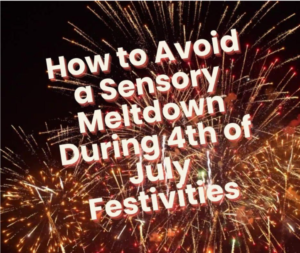The Fourth of July is synonymous with fireworks, parades, and backyard barbecues. However, for individuals with sensory sensitivities, the holiday’s festivities can be a minefield of overwhelming sights, sounds, and smells. Sensory overload can trigger meltdowns, turning a day of celebration into a stressful experience. But with the right strategies, it’s possible to enjoy the 4th of July while minimizing sensory overload.
Planning for a Sensory-Friendly 4th of July
- Choose Your Celebrations Wisely: Opt for smaller, quieter gatherings instead of large, crowded events. Consider attending a community fireworks display from a distance, where the noise and light are less intense. If backyard barbecues are on the agenda, find a quiet corner to retreat to when needed.
- Prepare a Sensory Toolkit: Pack a bag with sensory-friendly items like noise-canceling headphones or earplugs, sunglasses, fidget toys, weighted blankets, or calming scents like lavender. These tools can help create a personal oasis of calm amidst the chaos.
- Dress for Success: Choose loose-fitting, breathable clothing in soft fabrics to avoid tactile discomfort. Consider dressing in layers so you can adjust to changing temperatures and sensory needs.
- Stick to Routines: Maintain regular sleep schedules and mealtimes as much as possible. Familiar routines can provide a sense of stability and predictability during a potentially overwhelming day.
- Communicate Your Needs: Let friends and family know about your sensory sensitivities beforehand. This will allow them to be understanding and supportive if you need to take breaks or adjust plans.
- Prioritize Self-Care: Remember to take breaks throughout the day to decompress and recharge. Find a quiet space to relax, engage in calming activities like deep breathing exercises, or simply take a few minutes to yourself.
Sensory-Friendly Alternatives
If traditional 4th of July activities seem too overwhelming, consider exploring sensory-friendly alternatives. Many communities offer quieter celebrations with reduced noise and visual stimulation. You can also create your own sensory-friendly celebration at home with calming activities like watching patriotic movies, playing board games, or enjoying a picnic in a peaceful setting.
Remember: It’s perfectly okay to opt out of activities that trigger sensory overload. Your well-being is paramount, and there’s no shame in prioritizing your comfort and enjoyment.
The 4th of July can be a joyous occasion for everyone, including those with sensory sensitivities. With careful planning and thoughtful consideration, you can create a memorable and enjoyable holiday experience that respects your sensory needs.


